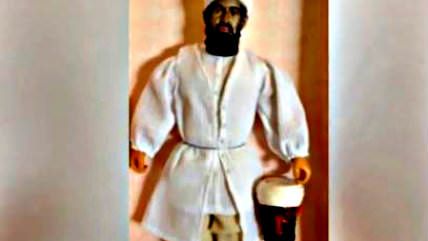Check Out the CIA's Demonic, Face-Melting Osama bin Laden Toy for South Asian Kids
The face of the toy was designed to melt off and reveal a demon once in the hands of Pakistani and Afghan children.

There's no way to go about this other than to lay out all the weirdness at once: In the mid-'00s, the CIA developed an Osama bin Laden toy with a face designed to melt off and reveal a demon once in the hands of Pakistani and Afghan children. The code name for the operation was "Devil Eyes."
Around 2005, former Hasbro toymaker Donald Levine—known for his work on G.I. Joe figurines—was asked to develop the toy for the CIA, according to The Washington Post. Levin's winning design? A bin Laden figure painted with a special material so that the normal face would peel away in heat, revealing a red and black demon-eyed face. (See the transformation here.)
"The goal of the short-lived project was simple," the Post says: spook children and their parents into turning away from bin Laden.
There's a dispute over how many of the figurines, if any, were ultimately delivered. A person with direct knowledge of the project in China said hundreds of the toys—one of which was seen by The Washington Post—were made as part of a preproduction run and sent on a freighter to the Pakistani city of Karachi in 2006.
The CIA, while not disputing that it had commissioned the bin Laden figures, said the project was discontinued shortly after the prototypes were developed.
"To our knowledge, there were only three individual action figures ever created, and these were merely to show what a final product might look like," CIA spokesman Ryan Trapani said. "After being presented with these examples, the CIA declined to pursue this idea and did not produce or distribute any of these action figures. Furthermore, CIA has no knowledge of these action figures being produced or distributed by others."
Regardless of how far the "Devil Eyes" project proceeded, it appears to have borne all the hallmarks of what are known in intelligence parlance as "influence operations." As part of its covert action programs, the agency has for decades tried to win the hearts and minds of local populations or turn them against a particular ideology.
Another recent CIA influence op was revealed in April: developing a Twitter-like social network in Cuba that was secretly run and monitored by the U.S. government. (The CIA itself joined real Twitter earlier this month.) Meanwhile, the FBI is trying to fool us all into thinking anybody actually uses the acronym BTDTGTTAWIO— "been there, done that, got the T-shirt and wore it out."
